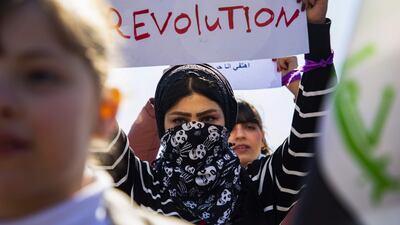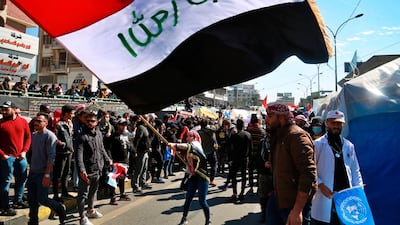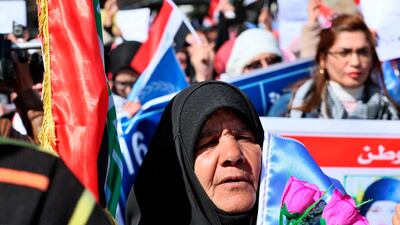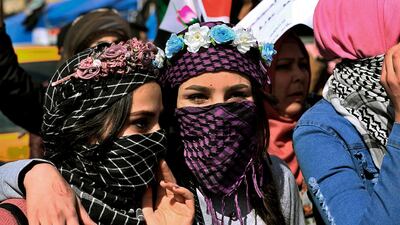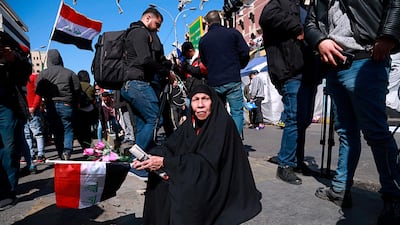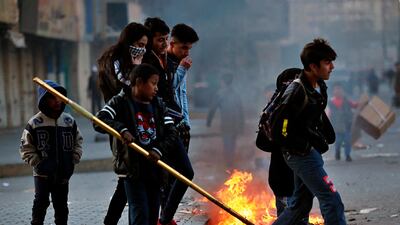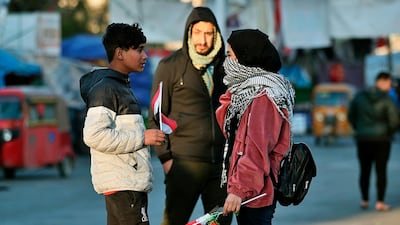Women crowded into streets across Iraq on Thursday to defend their role in the protests after controversial Iraqi cleric Moqtada Al Sadr said anti-government demonstrations should be gender segregated.
Marches in the country’s capital Baghdad and the southern city of Nasriyah drew hundreds of women holding posters and chanting in support of their right to demand a better future for Iraq.
"We want to protect women's role in the protests as we're just like the men. There are efforts to kick us out of Tahrir [Square, epicentre of the protests in Baghdad] but we'll only come back stronger," Zainab Ahmad, a pharmacy student told AFP.
"Some people were inciting against us a few days ago, seeking to keep women at home or keep them quiet. But we turned out today in large numbers to prove to those people that their efforts will end in failure," she said.
Mr Al Sadr’s comment, posted on Twitter, told male and female protesters to avoid mixing in tents during sit-ins, prompting an outpouring of derision from Iraqis on social media. Iraqi activists responded by posting satirical pictures of men and women cross dressing on social media and sharing hashtags celebrating female protesters, including #SheIsTheRevolution and #DaughtersOfTheNation.
Shortly before Thursday's women's march began, Mr Al Sadr once again took to Twitter to slam the protests as being rife with "nudity, promiscuity, drunkenness, immorality, debauchery ... and non-believers".
In a strange turn, he said Iraq must not "turn into Chicago," which he said was full of "moral looseness" including homosexuality, a claim that was immediately mocked online.
Women have been at the forefront of protests that have gripped the country since October 2019, marching shoulder-to-shoulder with men in the largest demonstrations since the US-led invasion of Iraq that toppled Saddam Hussein in 2003.
The uprising has brought Iraqis of all backgrounds together, uniting Sunni and Shia, rich and poor, men and women in calls for the overthrow of a government seen as corrupt and inept.
Waving flags and holding up banners, men and women poured through the underpass leading to Tahrir Square at the heart of the protests in Baghdad. Several held up handwritten posters that read "separating religion and state is much better then separating males and females." Another read: “revolt, resist and smile because you are the nation, the revolution will be completed by you.”
Iraqis have continued to voice their demands in the streets despite violent crackdowns by security forces since demonstrations broke out at the beginning of October with hundreds of thousands turning out to express their anger at endemic corruption, high unemployment, poor public services and interference by foreign powers.
More than 500 have been killed and tens of thousands injured since the unrest began.
Earlier this month, fresh clashes broke out between anti-government demonstrators and Mr Al Sadr’s supporters – distinguished by their blue caps – after the populist cleric withdrew his support for the protesters.
Eight people were killed after Mr Al Sadr supporters stormed a protest camp in the southern Iraqi city of Najaf. Chants of “down with filthy Moqtada” began trending on Twitter.
Mr Al Sadr, who holds significant influence among Iraq’s majority-Shia population, initially threw his weight behind anti-government demonstrators but withdrew his support to endorse the nomination of Iraq’s new prime minister Mohammed Allawi.
